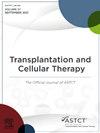心脏安全的造血干细胞移植(HSCT)治疗系统性硬化症(SSc)心功能受损患者的长期疗效
IF 3.6
3区 医学
Q2 HEMATOLOGY
引用次数: 0
摘要
ssc是一种破坏性的自身免疫性疾病,可影响多器官系统,死亡率高。三项试验(ASSIST、ASTIS、SCOT)证实,高剂量调节和自体造血干细胞移植可以显著降低SSc患者的疾病严重程度,提高总生存期。然而,由于调节方案中使用的高剂量环磷酰胺(CY)的心脏毒性作用,目前的指南建议将SSc心脏受损伤的患者排除在高强度调节HSCT之外。在西北纪念医院进行的SSc心脏安全移植试验(CAST)是一项连续的、非随机的研究,评估了心功能受损的SSc患者降低强度调节的效果。在2015-2019年期间,42名患者接受了降低强度的自体HSCT调节(氟达拉滨120 mg/m2 +ATG 6 mg/kg + CY 60 mg/kg±利妥昔单抗,500或1000 mg,±IVIG)。1年随访的初步结果是有利的;然而,CAST试验患者的长期结果尚不清楚。目的探讨低强度自体造血干细胞移植治疗伴有心脏受累的SSc患者的远期疗效。方法为了确定低强度调节后的长期结果,CAST患者通过电话同意参加目前irb批准的研究,并接受了关于SSc疾病状态、药物使用和器官功能的问卷调查。复发被定义为重新启动疾病调节抗风湿药物(DMARDs)。如果患者无法联系,则通过公共记录搜索确定生存状态。总生存期(OS)和无复发生存期(RFS)估计值采用Kaplan Meier法确定,并使用Cox回归确定移植前参数是否与OS或RFS相关。结果患者年龄中位数为49岁(20 ~ 65岁),女性占62%。42例PTS中有2例(5%)在移植后5年内失去随访。5年OS为75% (95% CI: 63-90%,图1)。5年RFS为61.3% (95% CI: 48-78%,图2)。移植后,1名(3%)患者发展为恶性肿瘤(乳腺癌),6名(14%)患者发展为新的自身免疫性疾病。年龄和性别与结果无关。表1显示了移植前参数与hsct后死亡率增加相关。只有SCL-70抗体的存在与复发增加显著相关(风险比2.8,95% CI: 1.1-7.0, p值 = )。结论:这些数据表明,对于某些伴有心脏受累的SSc患者,自体造血干细胞移植是一种潜在的有效治疗选择。本文章由计算机程序翻译,如有差异,请以英文原文为准。
Long-Term Outcomes of Cardiac-Safe Hematopoietic Stem Cell Transplantation (HSCT) for Systemic Sclerosis (SSc) Patients with Impaired Cardiac Function
Introduction
SSc is a devastating autoimmune disease that affects multiple organ systems with high risk of mortality. Three trials (ASSIST, ASTIS, SCOT) established that high-dose conditioning and autologous HSCT can significantly reduce disease severity and improve overall survival for SSc patients (pts). However, due to the cardiotoxic effects of high-dose cyclophosphamide (CY) used in the conditioning regimen, current guidelines recommend excluding pts with SSc cardiac involvement from high-intensity conditioning HSCT. The Cardiac-Safe Transplantation for SSc Trial (CAST) conducted at Northwestern Memorial Hospital was a sequential, non-randomized study that evaluated reduced intensity conditioning for SSc pts with impaired cardiac function. Between 2015-2019, 42 pts received reduced-intensity autologous HSCT conditioning (Fludarabine 120 mg/m2 +ATG 6 mg/kg + CY 60 mg/kg ± Rituximab, 500 or 1000 mg, ± IVIG). Initial results with 1-year follow-up were favorable; however, the long-term outcomes of CAST trial pts were unknown.
Objective
To determine the long-term outcomes of reduced intensity autologous HSCT in SSc pts with cardiac involvement.
Methods
To determine long-term outcomes after reduced intensity conditioning, CAST pts were consented by telephone to the current IRB-approved study and were administered a questionnaire regarding SSc disease status, medication usage, and organ function. Relapse was defined as reinitiating disease modifying anti-rheumatic drugs (DMARDs). If pts contact was not possible, survival status was determined through public records search. Overall survival (OS) and relapse-free survival (RFS) estimates were determined by Kaplan Meier method, and Cox regression was used to determine if pre-transplant parameters were associated with OS or RFS.
Results
The median age of pts was 49 years (20-65), and 62% were female. 2 of 42 (5%) pts were lost to follow-up prior to 5 years post-transplant. The 5-year OS was 75% (95% CI: 63-90%, Fig 1). The 5-year RFS was 61.3% (95% CI: 48-78%, Fig 2). Post-transplant, 1 (3%) pts developed malignancy (breast cancer), and 6 pts (14%) developed new autoimmune disease. Age and sex were not associated with outcome. Table 1 shows the pre-transplant parameters that were associated with increased mortality post-HSCT. Only the presence of SCL-70 antibodies was significantly associated with increased relapse (Hazard Ratio 2.8, 95% CI: 1.1-7.0, p-value = .03, Fig 3).
Conclusion
These data suggest that a reduced intensity conditioning regimen autologous HSCT is a potentially effective treatment option for certain SSc pts with cardiac involvement.
求助全文
通过发布文献求助,成功后即可免费获取论文全文。
去求助
来源期刊

Transplantation and Cellular Therapy
Medicine-Hematology
CiteScore
7.00
自引率
15.60%
发文量
1061
审稿时长
51 days
 求助内容:
求助内容: 应助结果提醒方式:
应助结果提醒方式:


